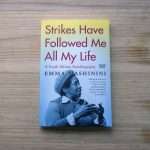Political Songs | Dub journalism, a cultural weapon
Linton Kwesi Johnson is famed as the inventor of dub poetry, but his ability to take history and make it relevant — as he does in ‘Reggae Fi Peach’ — makes him more of a journalist.
Author:
25 January 2019

“I don’t know what I have done to deserve it, but South Africans have been very kind to me.”
This is how Jamaican-born British poet Linton Kwesi Johnson, 66, ended his acceptance speech at Rhodes University when it bestowed an honorary doctorate on him in April 2017.
Widely regarded as the person who conceived dub poetry, in his speech LKJ gave credit to three exiled South Africans who played pivotal roles in his life as a 20-year-old Londoner, in what he called a “period of ordeal” from November 1972 to June 1973.
It started one Saturday afternoon that November. LKJ, then a member of the Black Panther movement, intervened when three plainclothes police officers used excessive force to arrest a black youth. LKJ was thrown in jail, too.
Related article:
The first South African was Barney Desai, the barrister who got him acquitted. The second was Lionel Morrison, who worked in the “race relations industry” and advised him how to deal with the racist police. The third was exiled novelist Lewis Nkosi, who wrote an article for The Sunday Observer about LKJ’s ordeal.
It turned out to be a turning point in his life.
“It was then that, as an aspiring poet, I made a number of decisions about language, orality and music, choices which determined the formation of my poetics,” said LKJ. “Having heard blues and jazz poetry, I decided that I wanted to write reggae poetry. My verse would be a cultural weapon in the black liberation struggles.”
Related article:
LKJ’s first book, Voices of the Living and the Dead, was published in 1974. But it was in his second book, Dread, Beat an’ Blood (1975), that his true voice came to the fore, with poems written in a Jamaican-via-London dialect. It was released as a record in 1978.
Forces of Victory, his first music album, was released the following year. It was set to the compelling grooves of Dennis Bovell and the Dub Band. Next came Bass Culture and LKJ in Dub in the same year, 1980, followed by Making History in 1984.
While based on the toasting (a style of lyrical chanting) of reggae DJs such as I-Roy and U-Roy, riding with vocal braggadocio over riddims, LKJ wrote the poetry first, then it was set to reggae music.
It was serious poetry, using the language of the black British working class to chronicle their lives of racist oppression. That it was combined with languid dub made sense. LKJ’s phonetic poetry sounds like music: you nod your head to it, you tap your foot to it. It makes you sway. It is deeply political poetry that makes you think, sing along to it and take action. It’s not poetry for rarefied elite spaces. It’s generous performance protest poetry made to be heard, not only read.
Related article:
LKJ didn’t like to be called a dub poet, even though he was the inventor of this style of poetry. If you listen to his poem songs, LKJ is more of a dub storyteller, a dub historian, a dub teacher, a dub orator and especially a dub journalist, which isn’t all that surprising when you consider that he worked as one for Channel Four in the United Kingdom.
A fine example of his dub journalism is Reggae Fi Peach off his second album, Bass Culture. It tells the story of Blair Peach, a teacher and antiracism activist who was killed by a blow to the head from a plainclothes police officer from the shadowy Special Patrol Group (SPG) on 23 April 1979, during an antifascist march in London
As any journalist will tell you, the secret to a good story is a strong intro. LKJ nails it on Reggae Fi Peach:
Everywhere you go it’s the talk of the day
Everywhere you go you hear people say
That the Special Patrol them are murderers (murderers)
We can’t make them get no furtherer
The SPG them are murderers (murderers)
We can’t make them get no furtherer,
Cos they killed Blair Peach the teacher
Them killed Blair Peach, the dirty bleeders
LKJ’s poetry is, like his 1984 album title, fundamentally about oppressed people making history. He takes very particular history and makes it relevant to people around the world. “I still begin with the particular, and hope to make it universal,” he said in a 2008 interview with The Guardian.
LKJ gets it right. He’s sold more than two million records worldwide.



